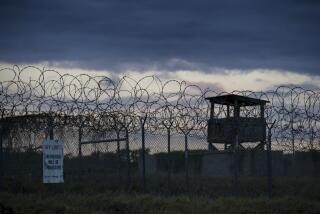Taliban POW predicts more attacks on U.S.
(RealVideo and QuickTime)
- Share via
BAHARAK PRISON, Afghanistan — Salahuddin Khalled, 27-year-old Pakistani and captured Taliban warrior, sits in a cell among 20 criminals and prisoners of war, plastic bags of clothes, metal pots and shoes hanging off the walls and dangling from the low log rafters.
Although captured by the Taliban opposition in 1996 and penned up in a one-story, mud-brick block of a prison, Khalled remains profoundly unrepentant.
Given the opportunity, he says, he would happily have helped hijack one of the passenger jets that slammed into the World Trade Center on that terrible morning in September. If freed from this prison, he says, he would eagerly volunteer for future attacks on America.
“Yes, if I had the chance I would do it, with my heart and soul,” said the trained terrorist -- a slight, scholarly young man with thick owlish glasses and a gentle voice, sitting on a dusty carpet in the prison warden’s office.
Soon, he predicted, there will be more terrorist operations, including the detonation of an atomic weapon in the United States.
Where would such a device come from? “We can find the means to build one,” he said.
Khalled, who holds a university degree in Islamic law, is among 21 foreign Taliban fighters from Pakistan, Iraq, Yemen, China and Myanmar held in this prison. Khalled was tutored in terrorist skills from 1992 to 1994 at a camp near the city of Khost, one of Afghanistan’s notorious training centers for Islamic radicals.
After fighting in Kashmir, where Islamic radicals are trying to force out an Indian government, he came back to Afghanistan and commanded 30 Taliban soldiers fighting the opposition Northern Alliance.
Captured by the opposition forces in 1996, he was locked up here, where he spends his time reading the Koran and writing letters to his father.
Khalled says he is a member of Harakut-al-Mujahideen, a Pakistan-based Islamic fundamentalist group with a reputation for militancy. Two members of the group were accused of killing a U.N. military official and wounding a French diplomat in Kabul in 1998, following an American cruise missile attack on several terrorist camps.
Harakut-al-Mujahideen is not part of Osama bin Laden’s al-Qaida network, Khalled said, nor does bin Laden finance the group. But when Harakut needed special training in weapons or tactics, Khalled said, bin Laden would lend them experts.
Baharak Prison sits on the rocky shores of the Panjshir River, deep in an opposition-controlled area, surrounded by steep, treeless mountains made of rock and clay and dust. There is only one road in and out of this isolated spot in the Hindu Kush mountains: a twisting one-lane dirt track dug into the side of the mountain.
The prison itself is a one-story, mud-brick block the color of the surrounding earth, approached by a single-lane bridge. Inside, six dark cells face a sunlit exercise yard.
Although Khalled applauds the carnage at the World Trade Center and Pentagon, he says he wouldn’t know who was responsible for it even if he was at large instead of in prison and cut off from the world. There was a strict code of silence, he said, among militants training in Afghanistan bases. Teachers told students never to reveal precisely what they were being trained for, he said.
“”If one classmate asks another,” Khalled said, “it is none of his business.”
Khalled defended the Sept. 11 attacks by saying he believed the terrorists’ aim wasn’t to kill thousands of innocent people, but to cripple America’s economic and military centers.
“Our target was to hurt the American government,” he said, clearly closely identifying with the attackers.
Asked if he feared retaliation by the United States, he shook his head.
“America cannot find where it should attack,” he said, speaking a Persian dialect through an interpreter. “You are looking all over the country of Afghanistan, and you cannot catch even one of them.”
After returning to Afghanistan from Kashmir in mid-1996, Khalled led his 30 soldiers into battle near the town of Jabal Saraj, north of Kabul. Northern Alliance forces routed the Taliban. After four hours of trading fire with the enemy, he said, he exhausted his ammunition and surrendered.
Today, America is his main enemy, he said.
More to Read
Sign up for Essential California
The most important California stories and recommendations in your inbox every morning.
You may occasionally receive promotional content from the Los Angeles Times.













